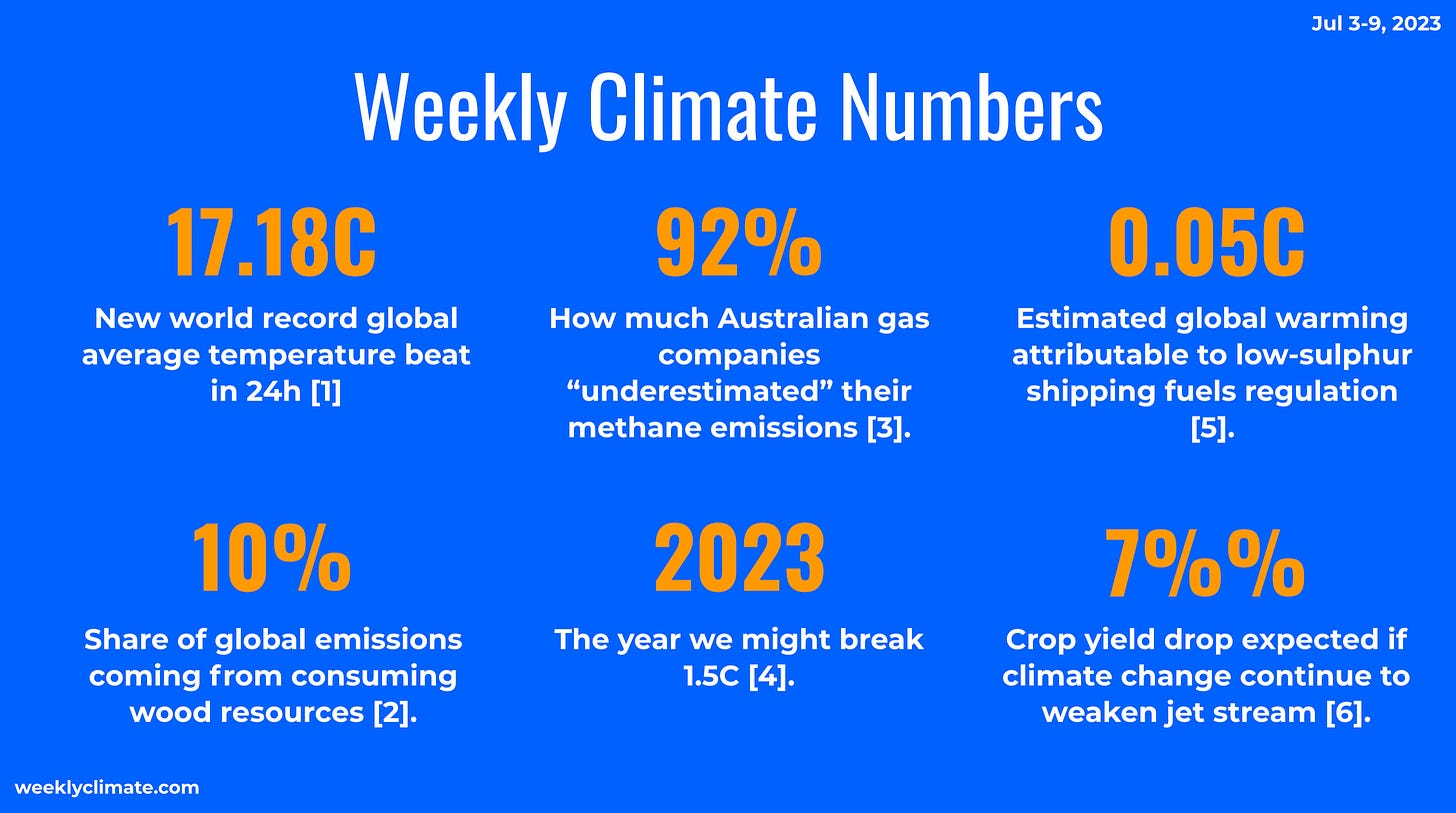[Jul 4-9’23] 2023 might break 1.5C
We should prepare for crop failures, Kenyan bank to finance 100.000 EVs, June’23 saw many climate red flags and fossil fuel company running COP28 planned green rebranding.
Welcome to this week’s edition of The Weekly Climate 🎉
References: [1], [2], [3], [4], [5] and [6].
A bit of doom and gloom this week. But there was really a lot of pretty poor news this week IMO.
‼️News you can’t miss
Here’s one important scary/bad (🙀), good (😻), interesting (😼) and fossil (💩) news item.
🙀 New study says the world should prepare for significant crop failures
😻 Kenyan bank to finance 100.000 electric tuktuks and bikes
😼 June 2023 saw many key global climate indicators with flashing red lights
💩 The fossil fuel company in charge of COP28 was planning to drop “oil” from their name due to reputation issues
👩⚕️ Status: Climate & Science
Let’s look at how we’re doing this week!
[#polarship] — The RRS Sir David Attenborough, a state-of-the-art UK polar research ship, will soon sail to Antarctica to study little-known ecosystem processes that are vital to better understanding climate change. The ship is equipped with 14 different laboratories, autonomous and remotely operated vehicles, and a moon pool that offers direct access to the sea below. The ship will collect data that could help scientists understand how the activity of tiny organisms living in the Southern Ocean can affect the ocean carbon cycle, which currently absorbs nearly a third of all human-caused CO2 emissions. The ship is also designed to provide comfort for scientists working months away from home.
[#heatrecords] — The world broke an all-time heat record twice in a row, with the planet's daily temperature reaching the highest ever measured by humans at 17.18C on July 4 (on July 3rd the record was beaten by 17.01C). This means at least since 1940 this is the hottest ever recorded. Extreme heat, made more likely by climate change and the El Niño weather pattern, has affected much of the United States and the world, with heat indices hovering in the triple digits. Scientists warn that climate change is making heat waves more severe, frequent, and longer-lasting, and that El Niño could push Earth temporarily past 1.5 degrees Celsius of warming, leading to severe drought, famine, and the spread of infectious disease.
[#junetippingpoints] — June 2023 saw many key global indicators flashing red warning lights, with Earth's critical reflective polar ice caps at their lowest extent on record, the hottest June ever measured, and oceans setting records for warmth on the surface and down to more than 6,000 feet deep throughout the month. Climate scientists warn that these extraordinary extremes could be an early warning of tipping points towards different weather or sea ice or fire regimes, and the tropical Pacific Ocean is shifting into the warm El Niño phase of a two- to seven-year Pacific Ocean cycle that can boost the average global temperature by 0.2 degrees Celsius, enough to stoke the planet's fever to a dangerous new high.
📰 The 7 Grand Challenges
⚡️Decarbonize Electricity
Clean electricity is the one do-or-die challenge we must solve.
[#solardrought] — As solar projects expand in California's desert communities, concerns over groundwater depletion and water scarcity are growing. Many of these communities rely solely on underground aquifers for drinking water, and the lack of data on the recharge rate of these basins makes it difficult to assess the impact of solar projects on the resource. While the state of California has implemented regulations to manage groundwater use, these regulations do not apply to federal lands, where most solar projects are being built. As a result, residents are calling for more oversight and mitigation measures to protect their water supply and local ecosystems.
🏘 Reduce impact of urban and rural areas
Lowering the impact of urban and rural areas.



